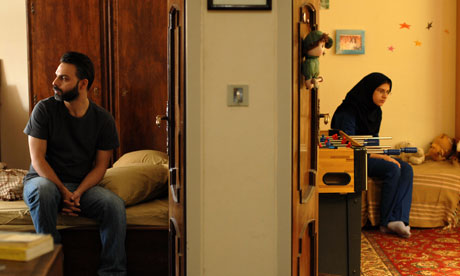
This morning I received this dvd in the post, much to my excitement. Few things entrance me as much as Iranian New Wave cinema, and this particular title has won so many awards that scrolling through the list on wikipedia will make you go cross eyed, so I was even more anxious to see this film than most. And it did not disappoint.
A separation is the sort of film that can keep you riveted to the screen throughout the most ordinary or domestic setting. This is common of many Iranian films, such as the White Balloon for example, where the viewer is simply watching a little girl trying to buy a goldfish for 90 minutes, or Ten, which is filmed entirely from the dashboard of one woman's car as she drives ten passengers around Tehran. Yet this simplicity never once seems boring, in fact it's the amazing realism that makes it so compelling. Like all good neorealism the film excels at making gripping drama out of the very ordinariness of life, because that's what we all know. This film has no chase scenes or special effects, there isn't even an ominous soundtrack, yet there are scenes in this film that are as enthralling as in any thriller.
For starters the acting is so totally real that it almost feels like a documentary, and in fact one of the film's two main settings (an Iranian divorce court) makes it very similar to the award winning and startling documentary Divorce, Iranian Style by Kim Longinotto and Ziba Mir-Hosseini. It's this total honesty and realism that makes many of these scenes so intense.

The story focuses on a couple filing for divorce, the reason? Because the wife Simin, does not want her 11 year old daughter to grow up under the current Iranian regime yet the husband, Nader, refuses to leave the country in order to look after his elderly father who has Alzheimer's. If this isn't a ripe enough bed for drama to develop, things take a major turn for the complicated when an accident in the home involving the father's young nurse leads to all manner of sticky situations, slowly unravelling both families, exposing the many tensions of a fractured Iranian society in the process. In this way it can be seen as a searing critique of the arbitrary judicial system and the inhuman laws of the country without ever mentioning politics. It shows the difficulties Iranians must face through their situations. No character ever even mentions the government. And it's precisely what this film doesn't say that has enabled it to be such a massive hit in its homeland, unlike the vocally anti-government Persepolis for example, which was banned.
And it's also this lack of politics that enables the story to transcend it's unique setting and become something more resonant in all cultures. Maybe this also helped it swoop the Golden Globe for best film not in the english language. Not to say it couldn't win simply on its merits as a film, because it truly is an exquisite drama, but given the current climate of hostility between Iran and the USA, it certainly was encouraging to see such a major award go to an Iranian film, which have usually been overlooked by American mainstream award panels.
Not only this, but visually this film also excels, using the framing and colour of images in a truly poetic way that is at times oddly calming and plaintive. Look out for the many symbolic ways in which the two main characters are positioned.
Consequently I would say this, along with The Artist, is definitely the finest film of 2011 that I've seen. A truly impeccable and refined drama that vividly depicts the pain and sadness of a family going through hard times, yet also the strength and humanity that hold them all together, making a lasting impression on the viewer. Unmissable.
.jpg)
No comments:
Post a Comment